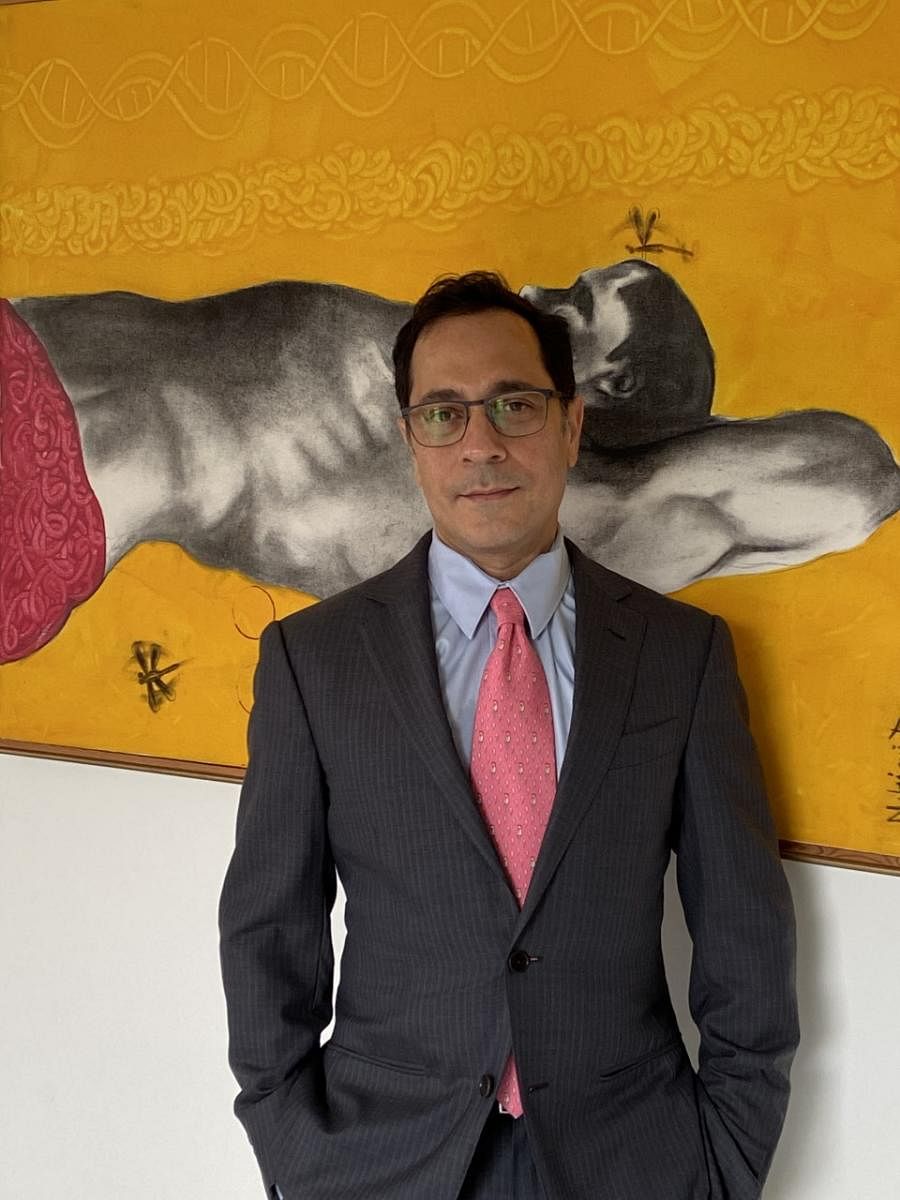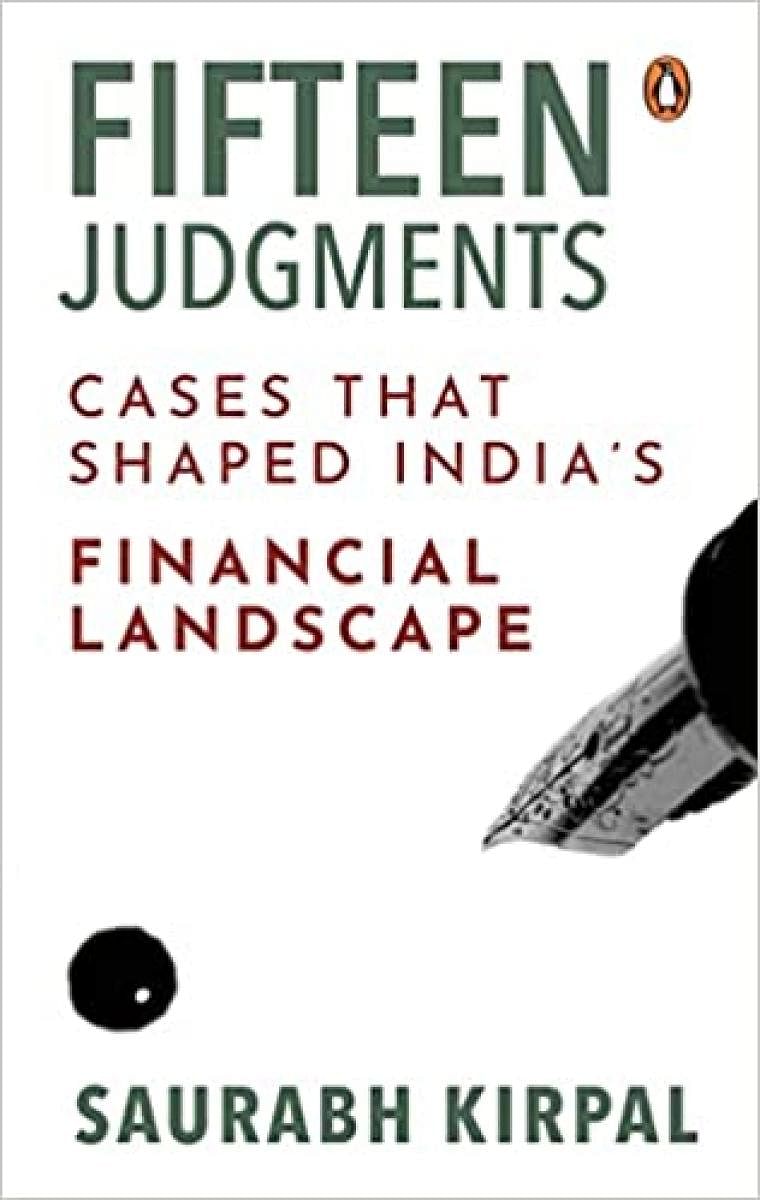

Saurabh Kirpal has been waiting in the wings for the past five years to be appointed as a judge of a constitutional court. Saurabh’s journey in activism began after he started to live as an openly gay man. Living as a gay man attuned him to the nuances of discrimination. He has come out recently with his latest release Fifteen Judgments: Cases That Shaped India’s Financial Landscape published by Penguin Random House. Here, Saurabh speaks about how writing allows him to help the common citizen familiarise themselves with one of the most important institutions of democracy, which is the court. He also speaks to his sense of affront with the re-criminalisation decision, what the Navtej decision means and why marriage equality is important.
What motivated you to write ‘Fifteen Judgments Cases That Shaped India’s Financial Landscape’?
The reason that I write books is to help the common citizen familiarise themselves with one of the most important institutions of democracy, which is the court. And while there is a lot of reportage about the sensational cases, there is very little around the actual decisions about the finance and economics of this country, which affects people’s day-to-day life. So I thought it was important for me to write in a manner that demystified the decision-making on issues that were fundamental to people’s wallets!
Your new book connects to your earlier book, ‘Sex and the Supreme Court’ and they both talk about the Constitution. What does the Constitution mean to you?
The Constitution to me, above all else, embodies a set of promises. For me, the Constitution is a charter to enable a country that was absolutely impoverished, and the people who were subjugated to attain true freedom.
In your new book, I was particularly interested in your chapter on the Vishaka judgement on sexual harassment. You say that Vishaka was about financial inclusion, how do you make this connection?
Women are probably the most under regarded and undervalued part of the workforce. They are 50% of the country, and they’re invisible. So if you want to develop financially, there are two aspects to it. One is the economy as a whole cannot grow if 50% of the workforce is excluded from it.
Secondly, I realised when I was researching the book that there are very severe negative economic repercussions in having a workplace where there is sexual harassment. Companies in which sexual harassment is part of a toxic work culture don’t do well.
Where did your sensitivity to the question of sexual harassment come from? It’s obvious that you feel passionate about it.
I must at the outset state that I’m not the same person I was 30 years ago. It is through the process of meeting people and reading their stories, talking to people who’ve been victims of sexual harassment, and talking to virtually any woman…. I don’t think there is a woman in this country who has not faced harassment of some form or other. Then it is just a given that I have basic empathy with what they are going through because if I want to be treated well, I think it’s important that I treat other people with respect.
Do you want to tell us about how your quality of empathy developed?
I grew up in a very privileged background, surrounded by all that anyone could want. I come from an upper caste family which is wealthy. My father was a judge. So I thought everybody lived my kind of life. I think it’s only when I came out and started living as an openly gay man, that I became more attuned to discrimination. Though I did not face the kind of discrimination that perhaps a trans-Dalit might feel or a woman might feel, I nevertheless became more attuned to discriminatory language. I could pick up nuances which other people might have missed. I think empathy is almost a habit, which has to be inculcated.
What distinguishes the greater apes, including a man from a large number of other species, is our quality and ability to form social bonds, which require empathy.
When you see the media reporting about you, it’s often about whether India will get its first gay judge. The point being missed is what you spoke about so beautifully. For you, being gay is not about an identity alone but about having a worldview and empathy with the suffering which comes with being gay. Being gay, for you, opens out an understanding of what discrimination is like…You are not just telling us a conventional coming out narrative but rather how through coming out you are understanding the world differently. When did this shift happen for you?
To be honest, I think it’s a process. I can’t say that there was a Eureka moment when I woke up and said, Hmm, this is it. That’s not how I am. And I don’t think most people are, people don’t change dramatically overnight. So this is a process and an evolution, I think that happened to me, because of the kind of people you meet… And I suppose the one really big thing that bothered me and a whole generation of us, including you, is the whole 377 litigation, the fight and the struggle. It’s something that did deeply impact me…
One of the triggers for ‘you becoming you’ was the 2013 re-criminalisation judgement...
The hearings (in the Kaushal case) were disastrous. It was a mockery of the Constitution as lives and people were being discussed in caricatures and sexual acts were spoken about rather than what it truly meant for a queer person. Then comes this glorious judgement, which was a slap on my face. It showed me how tenuous my life was and how easy it would be for someone or some power, or authority to come and reduce me to nothingness. You know, it’s all well, and good to say that I am not only gay, that it is one facet of my character. But it is such a fundamental aspect of my character. It is so deep about me that it’s no longer just one facet. It is what makes me substantially who I am. So when I was labelled as a minuscule minority, and the rest of the country didn’t care about me, I felt a loss, I felt distraught…It was then that I got involved with the litigation.
Do you think we got everything we wanted from the judgement in Navtej Singh Johar?
I think we got pretty much everything we could reasonably have expected to get from the judgement. We were looking for a solid foundation to be laid. One judgement can’t be a miracle cure for all issues. If it is just that one judgement that decides everything, then you simply have to overrule that judgement, to undo all the good that has been done. I’m a firm believer in having a corpus of jurisprudence, which will protect different facets of your rights. So that there is a consistency in judicial thinking, which is tougher to dislodge than just one judgement.
One of the impacts of Navtej is that we regularly hear of courts across the country passing orders, protecting same-sex couples through habeas corpus petitions. There is also, of course, the marriage case in the High Court. So there is a slow body or a corpus of jurisprudence being built. There is also emerging a body of judges who are empathetic to the cause.
In terms of the entire marriage petition, what is your reading of the affidavit of the government which opposes marriage equality?
Well, I think it’s a ‘one step too far’ kind of affidavit. It is based on a very Sarkari mindset that the government thinks that they are giving us rights. They don’t recognise that they are simply participants in a constitutional process. And they have a constitutional obligation to uphold my rights, which have come to me through the Constitution. So when they say that it’s okay, decriminalise but don’t give every other right. I think it’s a deeply flawed understanding of the relationship between the individual and the state and the role of the government in that process. I’m disappointed, but not surprised that the government says that marriage is only between a biological man and a biological woman. This viewpoint certainly has no place in modern society. And I don’t think it has a place in the hearts and minds of the youth of our country as well. These affidavits are being filed by a generation of people who will find themselves on the wrong side of history. Of course, these may be famous last words, but I think I’m reasonably sanguine.
Your name has been put forward for the office of judgeship of the High Court of Delhi. Give us a sense of how that transpired.
I remember it was a few days after my birthday in April 2017, that I got a call from a senior judge of the Delhi High Court saying, how old are you and I said, I turned 45, three days ago. And he said that I was being considered for the post of judgeship, but I needed to give my consent. I said that there are some things I need to come and speak to you about. You know, I’m out to the bar, I was not sure that the judges necessarily knew about my sexuality. I did not want to hide it, become a judge and then say, ‘Hey, I’m gay’. So I went and spoke to them. They were all sympathetic. But they took their own time ultimately, in decision-making. So it was only in October of that year that the Delhi High Court sent my name to the Collegium. Then again, one year passes. I think it was only two days before the Johar judgement that the Collegium sits and decides to defer my name because of some Intelligence Bureau report that has come. It is then deferred the second time, and the third time and finally, the fourth time, which is November of last year, that the Supreme Court finally approves it. So in the meanwhile, the Supreme Court is writing to the government saying that all right, you mentioned the Intelligence Bureau worry and concern, you had four and a half years to look into it. So please tell us what is the concern. The government has been unable in the last five years to say what its problem is, which is why I am led to believe that the real reason is my sexuality, because if there was something else, which was worrying them, they would have been able to detail it in five years, and they found themselves unable to do so. The Collegium is indeed a kind of black hole. I think it’s a deeply flawed system which lacks all transparency, but the government is no better!
Disclaimer: The views expressed in the interview are the personal opinions of the interviewer and interviewee.